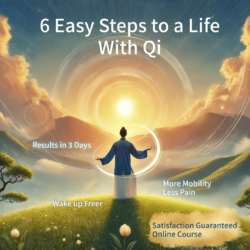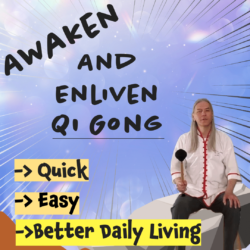Qi and The Independent Spirit
Study Guide Summary: Qi and the Independent Spirit by Master Steenrod
Main Topic
Qi Gong empowers practitioners to take control of their own health through tools for maintaining and restoring physical and emotional well-being.
Key Points
1. Characteristics of Qi Gong Practitioners
- They value tools to manage their health independently.
- Two main goals:
- Maintenance: Consistent, healthy lifestyle.
- Restoration: Recover from stress, illness, or injury.
2. Qi Gong vs. Western Approach to Health
- Western Health Mindset:
- People often neglect maintenance, leading to eventual collapse.
- Western medicine intervenes at the point of crisis to restore partial functionality.
- Qi Gong Health Mindset:
- Practitioners balance their lives by incorporating qi gong regularly.
- This helps maintain health and prevents extreme breakdowns.
3. Benefits of Qi Gong
- Acts as preventative care to maintain balance and health.
- Requires a small, consistent time investment.
- Provides tools to:
- Mitigate stress and aging.
- Restore functionality to a reasonable level based on age and circumstances.
- Supports autonomy in health decisions.
Key Takeaway
By integrating qi gong into your routine, you maintain the ability to enjoy life while addressing health challenges proactively.
For Beginners
- Try an inexpensive course to experience the benefits firsthand.
Closing Message
Qi Gong is a powerful tool for health and balance. Master Steenrod encourages everyone to give it a try and wishes the best for all listeners!
Supplement: Qi Gong Healing and the Independent Spirit
Why Do Independent Thinkers Choose Qi Gong?
People with an independent spirit often seek methods that let them take charge of their health. Qi Gong offers exactly that—an intelligent, time-tested system for physical vitality and emotional regulation. Unlike reactive approaches to health, Qi Gong is preventive and empowering. It’s especially attractive to those who value self-reliance and want to avoid dependence on crisis care.
Qi Gong Healing and Recovery
In Qi Gong, healing is not a one-time event—it’s a daily commitment. Practitioners use breathing, movement, and stillness to restore themselves from stress, aging, illness, or trauma. This approach to qi gong healing cultivates a long-term baseline of wellness. It’s particularly useful for those managing invisible loads: chronic stress, emotional overwhelm, or burnout.
A Smarter Way to Stay Balanced
One of the major draws of Qi Gong for independent people is that it’s intelligent. You don’t have to give up your freedom to stay healthy. Instead of waiting for collapse, you gently steer your system toward balance each day. That’s why qi gong healing is more than just physical—it’s a mental and emotional self-regulation system rooted in centuries of wisdom.
Carry your practice beyond the mat.
The Refined Qi Gong Collection blends stillness and style — inspired by the same principles you train with.
Frequently Asked Questions
What does it mean to be an “independent spirit” in the context of qi gong?
In the context of qi gong, an independent spirit refers to someone who seeks the ability to manage their own emotional and physical health without over-reliance on reactive medical systems. These individuals are drawn to qi gong because it empowers them with daily practices for self-regulation and healing.
How does qi gong healing help maintain independence?
Qi gong healing provides tools to prevent imbalance and recover from stress, illness, or aging. It supports long-term autonomy by allowing practitioners to manage symptoms before they escalate, fostering resilience and emotional clarity without waiting for a health crisis to occur.
Is qi gong healing useful even if I’m not ill or injured?
Yes. One of qi gong’s core strengths is preventive care. It helps maintain energy, clarity, and emotional stability in everyday life. Many practitioners report improved mood, better sleep, and greater vitality even when not experiencing illness.
How does qi gong compare to Western wellness practices?
Western systems often focus on intervention after a problem arises. Qi gong healing is proactive and designed to help maintain balance throughout life. It can complement Western approaches, but it operates from the philosophy of consistent, mindful self-care.
Where can I learn more about qi gong healing?
You can explore our Qi Gong Healing resource page for in-depth articles, beginner-friendly practices, and free courses designed to support your healing journey.
Transcription of the Explainer Vid, "Qi and the Independent Spirit."
Hello.
I am Qi Gong Master Mikel Steenrod with Water Mountain Virtual.
For today’s talk, I want to take a look at one of the common characteristics of qi gong practitioners—a characteristic that I have observed across many decades and among many, many practitioners.
The feature that is most common, I would say, is that a qi gong practitioner seeks tools to determine their own health.
What Does This Mean?
Maintaining Health
A qi gong practitioner has the ability to sustain a consistent, healthy lifestyle—both emotionally and physically.Restoring Health
The practitioner possesses the tools to restore their health when it is compromised.
As the mind experiences stressors and sharp blows, and as the body undergoes illness, injury, and aging, qi gong provides tools to restore balance. Prior to that, it offers the tools to maintain an even keel.
But, of course, life happens—even with this even keel.
How Is This Different From Others?
In the West especially, I’ve noticed that people often follow this pattern:
- Do what they want.
- Do what they want.
- Do what they want.
- Then experience a collapse.
At that point, Western medicine intervenes to restore some form of normalcy.
Is This Criticism of Western Medicine?
Not at all. It’s incredibly difficult for anyone to intervene after a long period of neglect and restore complete normalcy.
This applies to both qi gong and Western medicine. When you’ve gone without maintenance, the health you regain may not be the same as it was in earlier years. Instead, you achieve some form of functional recovery.
The Role of Qi Gong
With qi gong, you have the ability to maintain health. It follows this pattern:
- Do what you want.
- Do qi gong.
- Do what you want.
- Do qi gong.
This way, you can sustain your health while also preserving your ability to make decisions about your own life.
Why Is This Approach Beneficial?
Qi gong practitioners know that by dedicating a small amount of time to the practice, they can erase many of the ills that arise from other activities. Additionally, they can restore themselves to a reasonable level of operation, considering age and circumstance.
Is Qi Gong Right for You?
If this sounds interesting to you, then perhaps you are a potential qi gong practitioner.
If you’re not already a practitioner, you can always sample this for yourself by trying one of the free courses available on this website. Give it a try and see what happens!
Thank you for listening to me.
I wish you the best!
Related Articles and Videos
Qi Gong Healing: Ancient Practice for Energy, Balance and Emotional Health
Qi Gong for Daily Energy – 5-Minute Routines to Stay Focused and Calm
What Is Qi Gong? A Beginner’s Guide to Energy Healing
Qi Gong for Letting Go: The Practice of Plucking the Blossom
Types of Qi Gong: Medical, Martial, Spiritual and Healing Guide
Yin and Yang Explained: The Real Qi Connection
How Qi Gong Frees You From Burdens
How Qi Storage Affects Your Life


One Response
20 yrs ago when I had walked into the WATER MOUNTAIN Qi GONG , I had felt an atmosphere of health and healing . One of the members had given me a sample of a position in the Qi Gong Balances. I could readily feel the calm of the Standard Breathing as I raised and lowered my hands and arms at my anterior body; also known in our healing classes as the CV . I have learned that the Qi Gong that I have used in healing myself can be used and given to others for their body, mind and healing experiences. It’s been and remains a VERY POSITIVE element of my life.